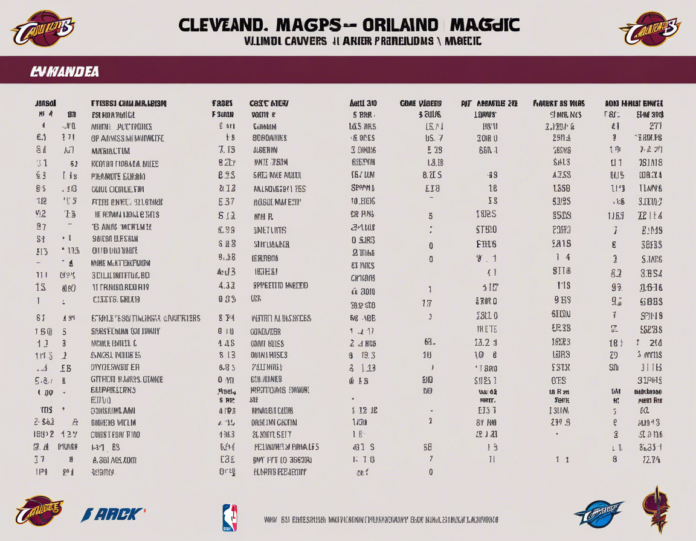As basketball fans eagerly await the upcoming matchup between the Cleveland Cavaliers and the Orlando Magic, all eyes are on the key player stats that will influence the outcome of the game. Both teams have their stars and rising talents, making this matchup an exciting one to watch. Let’s delve into the player statistics of each team to get a better understanding of what to expect in this highly anticipated game.
Cleveland Cavaliers Player Stats
LeBron James
- Points per game (PPG): 27.3
- Assists per game (APG): 9.1
- Rebounds per game (RPG): 8.3
- Field Goal Percentage (FG%): 54.2%
LeBron James, a basketball icon, continues to dominate the court with his scoring, playmaking, and rebounding abilities. His versatility and leadership make him a force to be reckoned with in every game he plays.
Kevin Love
- PPG: 19.1
- APG: 2.8
- RPG: 13.5
- Three-Point Percentage (3P%): 41.2%
Kevin Love’s exceptional rebounding skills, coupled with his outside shooting ability, make him a critical asset for the Cavaliers. His contributions on both ends of the court are vital to the team’s success.
Collin Sexton
- PPG: 16.7
- APG: 3.0
- Steals per game (SPG): 1.2
- Free Throw Percentage (FT%): 84.6%
As a rising star in the league, Collin Sexton has been showcasing his scoring prowess and defensive capabilities. His speed and agility make him a threat in transition plays and one-on-one matchups.
Orlando Magic Player Stats
Nikola Vucevic
- PPG: 24.2
- RPG: 11.6
- Blocks per game (BPG): 1.0
- FG%: 53.7%
Nikola Vucevic’s dominance in the paint, combined with his scoring touch, makes him a cornerstone of the Magic’s offense. His ability to control the boards and protect the rim provides a solid foundation for his team.
Evan Fournier
- PPG: 18.9
- APG: 3.6
- 3P%: 38.5%
- FT%: 81.3%
Evan Fournier’s scoring versatility and knack for hitting clutch shots make him a valuable asset for the Magic. His ability to create his own shot and stretch the floor adds a dynamic element to the team’s offense.
Markelle Fultz
- PPG: 14.6
- APG: 6.7
- SPG: 1.3
- FT%: 77.9%
Markelle Fultz’s resurgence in Orlando has been a feel-good story in the NBA. His playmaking abilities, defensive intensity, and improved shooting have greatly benefited the Magic, adding depth to their backcourt.
In this highly anticipated matchup between the Cavaliers and the Magic, the performance of these key players will undoubtedly have a significant impact on the game’s outcome. Fans can expect an exciting display of talent, skills, and competitiveness as these two teams battle it out on the hardwood.
Frequently Asked Questions (FAQs)
1. What is the importance of player statistics in basketball?
Player statistics provide valuable insights into individual performance, strengths, and areas for improvement. Coaches, analysts, and fans use these stats to evaluate players, adjust strategies, and make informed decisions.
2. How do player stats impact team performance?
Player stats directly influence a team’s success by showcasing each player’s contributions to scoring, rebounding, defense, and playmaking. Teams with well-rounded players who excel in key areas typically perform better on the court.
3. What are some advanced player stats that are commonly analyzed in basketball?
Advanced player stats like Player Efficiency Rating (PER), True Shooting Percentage (TS%), Win Shares (WS), and Box Plus/Minus (BPM) provide a more comprehensive analysis of a player’s overall impact on the game beyond traditional stats.
4. How do individual player stats contribute to team chemistry?
Understanding each player’s strengths and tendencies through their stats helps teammates build better chemistry on the court. By leveraging each other’s skills, players can create synergy and elevate the team’s performance.
5. Which player stats are most important for assessing a player’s overall impact?
While points per game (PPG) are essential, other stats like assists, rebounds, steals, blocks, efficiency ratings, and shooting percentages collectively offer a more complete picture of a player’s influence on both ends of the court.
6. How do players use their stats to set personal goals and track progress?
Players often set individual performance goals based on their stats to improve specific aspects of their game. By tracking their progress over time, they can identify areas of growth and measure their success in achieving their objectives.
7. Can player stats be misleading at times?
Player stats are valuable but can be misleading if not viewed in the right context. Factors like playing time, team dynamics, opponent strength, and game pace can influence stats, so it’s essential to consider these variables when analyzing performance.
8. How do coaches utilize player stats to make strategic decisions during games?
Coaches rely on player stats to make in-game adjustments, rotations, and play calls based on individual matchups, hot hands, defensive strengths, and weaknesses. Stats help coaches tailor their strategies to optimize team performance.
9. What role do player stats play in player evaluations for trades, drafts, and contracts?
Player stats serve as a crucial tool for team executives and scouts to evaluate players for potential trades, draft selections, and contract negotiations. Performance data helps assess player value, potential impact, and fit within a team’s roster.
10. How can fans use player stats to enhance their understanding and enjoyment of the game?
Fans can deepen their appreciation for basketball by analyzing player stats, following player trends, and predicting game outcomes based on statistical insights. Understanding the numbers behind the game adds a new layer of excitement and engagement for fans.
